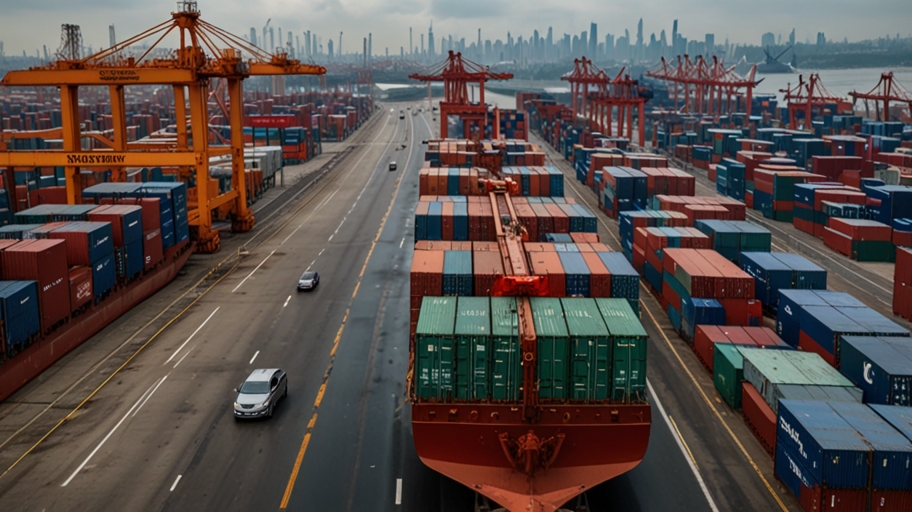Even now with the world being under significant changes and adapted supply chains to new trade routes – the recent introduction of the Cape of Good Hope route in particular, the businesses continue the delivery of their goods to various destinations by the fastest route.
This interim solution is even more important to the economies of southern Europe because of the ports that act as major access points from Asia to the Mediterranean and further on.
The consequences for the infrastructure and inland networks as a result of the massive shipment of goods do not really manifest themselves until later, thus the necessity of managing and optimizing capacity becomes the main objective.
The clients’ logistics providers are supporting and promoting the diversification of new ways for goods, that are heading to Europe, to avert possible upheavals.
In the north of Europe, the capacities of the terminals in the places like Rotterdam and Bremerhaven remain unchanged, having full yard capacity density acting as an indicator of the fact.
However, the situation in some terminals is likely to worsen due to the excessive number of delinquent parts, and, therefore, the clients are kindly requested to dispose of them, thus retaining the operating efficiency.
With regard to the case of southern Europe, the problems are still persisting, whereby there is now higher density of the yards in Valencia and Barcelona. Algeciras terminal claims not a big problem at the moment and maintains good quality and productivity on the one hand, and therefore, the handling capacity will be reaching a high point in the mid of April since there will be a lot of trades in and out.
Tariffs are still the hottest topic when it comes to the customs taking the global lead. In spite of the hard times, businesses are advised to engage with people dealing with trade and customs to get the exact picture of the what-ifs so that they can subsequently come up with an appropriate plan.
The EU has taken the step to modernize the customs formalities, the third release of the Import Control System 2 has been adapted to include road and rail carriers from April 1. Traders who ship goods into the EU by rail or road should make sure their carriers comply with new requirements of the Entry Summary Declaration.
Moreover, the EU has introduced new regulations and compliance decisions to implement the Carbon Border Adjustment Mechanism. The principal amendments are that importers of CBAM goods have to file their applications in the EU Member State where they are established, and the processing period for customs is 120 calendar days.
According to the introduction of compliance considerations, for instance, if customs or tax violations have been made or market abuse has done, they might serve as rejection reasons for applications.
As far as the elimination of a 90-day waiting time upon revocation is concerned, the business community is the ones to blame and should apply well in advance of the transaction so that they do not face a similar predicament.
As a result of the deepening trade tensions among the global economic powerhouses, the repercussions are already being felt in the global supply chains. Adapting to ongoing uncertainties is an imperative and so is the need for companies to move ahead with their planning endeavors.
The European Commission turned itself into a great regulator by its action of fining tech giants with significant amounts of money in the past. Not only corporate circles but also such industrial reflectivity is quite visible in the ongoing trade discussions.
Tariff adjustments can be used to retaliate against the goods that are essential to consumers, and a balanced, moderate adjustment is preferred. These retaliatory tariffs are probably only a step in a series of negotiations, which, in the end, produce an all-embracing market agreement.
One thing that is not clear is of what kind the tariffs will be and, of even greater significance, from which side the response will come and what the scale is going to be. The pattern of the actions taken by states up to now witnesses their intent to apply counter-measures precisely rather than generally, in other words, in a way where they can save themselves the most and benefit the most from their adversaries.
The trade of big economies with each other is not only of the factory goods nature. With the growing importance of services, there is a larger part of the business relations and such interdependence. Any disruption of this intricate web of economic ties may cause ripples throughout the world in terms of economic growth and smoothness.
The business world and the government will have to find their way through the difficulties that arise, and prompt and clear communication as well as effective and practical planning will be the key.
The months ahead are expected to be the time when it is decided if the existing trade wars are just temporary interruptions of the global economy or are the beginning of a new world of economic relations.
